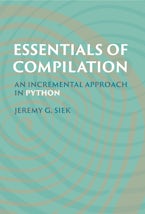This book documents two results that run counter to conventional wisdom about the Smalltalk-80 system.
This book documents two results that run counter to conventional wisdom about the Smalltalk-80 system. It shows that a reduced instruction set computer (RISC) can offer excellent performance for a system with dynamic data typing, and that automatic storage reclamation need not be time-consuming. The Smalltalk-80 system makes it possible to write programs quickly by providing object-oriented programming, incremental compilation, run-time type checking, use-extensible data types and control structures, and an interactive graphical interface. However, the potential savings in programming effort have been curtailed by poor performance in widely-available computers or by high processor cost. To solve these problems, a group of researchers has designed and built the SOAR (Smalltalk on a RISC) microprocessor which is documented in this book. Their findings suggest that: the language-specific hardware in SOAR doubles its performance over a RISC II with the same cycle time; generation scavenging, a storage reclamation algorithm developed by the author, consumes only 3 percent of the CPU time, in contrast to the 9 percent of comparable Smalltalk-80 systems; and that the SOAR microprocessor should run as fast as an ECL Dorado minicomputer, despite a five-to-one handicap in basic cycle time. They also identify six features that substantially improve performance, as well as seven that contribute little to performance.
Contents
Introduction • Previous Work • The SOAR Architecture • Performance Evaluation of the SOAR Architecture • Non-Disruptive High Performance Storage Reclamation • Scavenging Data with Intermediate Lifetimes • Conclusions • Appendix A: Detailed Performance Evaluation of Individual Features • Appendix B: Raw SOAR Data
The Design and Evaluation of a High Performance Smalltalk System is a 1986 ACM Distinguished Dissertation.












